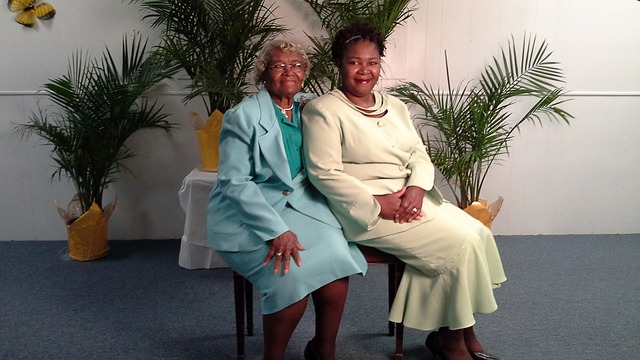Disclaimer: This page may contain affiliate links. We may earn a small commission for purchases made through links in this post, at no extra cost to you.
MS in African Americans
Scientist are finding that MS in African Americans may not be as rare as we've always thought it to be. There are several reasons for this, as well as the unique set of challenges faced by African Americans as a result of this difference.
Early history of MS in African Americans
The reason for the belief that African Americans didn't develop MS very often, or at least less than the white population, is based on two incomplete studies. One particular study, done in the late 70's, showed that white males were twice as likely to develop multiple sclerosis than African American males.
The reason for this was probably due to the fact that the group of men in the study only contained a very small number of black males. This would obviously skew the results to show an inaccurate number.
Another study showed that there were very few people diagnosed with MS who lived in Africa. The reason for this was that there weren't and still aren't very many MRI scanners or neurologists, for that matter, in Africa. This would make it nearly impossible to diagnose MS even if a doctor suspected it.
Other reasons for inaccurate results

Within the African American community, there are other reasons that keep us from being diagnosed with multiple sclerosis. Many people of color were, and still are, less likely to seek medical help. We don't always trust the medical community to do right by us, so we tend to stay away until a situation is at a critical point.
This distrust most likely had to do with the experiments which were done on African American men and woman in post slavery times. The Tuskeegee Syphilis Study from 1932 until 1972 was one example. Other lesser known experiments were done on women of color without their permission and without anesthesia, to learn more about their bodies.
The results of these studies and experiments, caused people of color to shy away from doctors and hospitals out of fear and distrust. Many diseases which could have been controlled were left unchecked and allowed to progress within the African American community. We simply learned to live with them without the aid of medical intervention.
What's happening now
With less people knowing about the past, and more focus on awareness of diseases like multiple sclerosis, more and more African Americans are getting diagnosed. The numbers are showing that MS occurs at a similar, if not higher rate, than whites depending on what element researchers are studying.
It has been found that African American women are more likely to develop MS than people of European ancestry, go figure. Recent studies show the following interesting results.
- A military study showed 46% more cases of MS in blacks than in non-hispanic whites
- Out of 496 newly diagnosed people, blacks had a 47% higher rate of MS than whites
- The same study showed that black woman developed MS at 3 times the rate of black men, higher than the general population of 2 to 1
- A follow up study showed that rates of MS in families are similar at 26% in both black and white families
These studies show that multiple sclerosis in the African American community have, for the most part, been around all along. The myth that people of color don't get MS, is just that, an unfounded myth. As more and more black people participate in studies, doctors and researchers can also see how the disease affects us differently, as well.
Differences in how MS affects African Americans
With more and more people of color being diagnosed with MS, doctors are learning how it affects black people differently. Here are a few of the differences that are showing up.
- One of the most common symptoms are optic neuritis (Cir had this)
- Another common occurrence is transverse myelitis where damage to the spinal cord causes mobility problems (which Cir also has)
- More African Americans will eventually need canes and wheelchairs (like Cir)
- The disease is more aggressive in blacks than whites
- African Americans tend to have more spinal cord lesions
- Men may have earlier onset MS than women in African Americans
More studies need to be done, of course, to verify these findings, however, and African Americans are becoming more open to participating in them. If for no other reason, than to find out what the differences and commonalities are in our communities.
Why the differences?

So why do these differences prevail and what can we do to stop them? If we look at cultural norms specific to the African American community, we can see why we feel the way we do. Here are a few of the things which influence the choices we may make in regards to how we deal with our health problems.
- distrust of doctors
- want to be seen as strong, not weak or vulnerable
- we don't discus health problems with family or friends
- fellow church members will look down on you
- you lack faith if you talk about having multiple sclerosis
- won't take medication because we don't want to "claim" the disease
- family may feel afraid or ashamed that you "did something" to get MS
- when symptoms aren't apparent, don't talk about them, they'll "go away"
- feel that we won't be treated well by health professionals because of our race
This is only a sampling of the beliefs within the African American community. And because we aren't familiar with other cultural beliefs throughout the world, there may be more reasons to add to this list when talking about people of color on a global scale.
Disease treatment for African Americans
Another area where doctors are see differences is the types of effective treatments within the African American community. Cir was unable to tolerate any of the interferon type treatments available for MS. We found that this was true for many others as well, those we knew personally, and those we read about.
Cir took Copaxone for several years, and it eventually stopped working for him. Also, he was taking it when the protocol was a daily injection. He went from that to an oral medication - Tecfidera - which we feel worked okay. Now Cir is taking Tysabri and it seems to be working well.
According to research, both Lemtrada and Tysabri, seem to work just as well in African Americans as it does in Caucasians. Testing for the JC virus, which causes PML or progressive multifocal leukoencephalopathy - a rare brain infection - is done to make sure you are eligible. Cir's bloodwork has been fine.
The cost of treatments might also be a deterrent. If you don't have insurance or receive disability which comes with Medicare and are not eligible for Medicaid, obtaining the medication may be impossible. The high cost may cause you to not even consider taking any treatment at all.
Most MS medications have financial assistance programs which will cover most, if not all, of the costs involved with the treatment. You need only contact them, fill out a few forms, send in proof of need and they will give you the medication. If you would like to take something to slow the progression of your MS, by all means take advantage of these programs. It is not a difficult process.
Previous health problems
If you are an African American, unfortunately you, no doubt, have people in your family who are overweight and deal with heart disease and/or diabetes. As a group we are predisposed to not only these, but also high cholesterol and high blood pressure as well.
Why? Because so many of us are overweight or obese to the tune of 63% of men, and 77% of women. That's too high. If we develop MS on top of these health problems, our overall health will be greatly compromised.
One of the recommendations for people with multiple sclerosis is to develop healthy habits, such as exercise and eating healthy foods. The foods, we as African Americans have traditionally eaten in the past are not necessarily all bad for us. Fried and very fatty foods may contribute more to being overweight if eaten in excess.

The way we, and many people, eat now, consuming more and more fast foods or their overly processed alternatives, are not healthy choices. If you don't have the energy to prepare and cook whole foods on a daily basis, you are more likely to fall into a pattern of eating these "easy to prepare", nutritionally sparse, items that try to pass for food.
To compound the problem, African Americans are less likely to exercise, as well. And how do you start exercising after you find that you are sick with a disease that messes with your ability to walk? A dilemma for sure, however, not an impossible one to overcome. The trick is to begin. Not really a trick, however, it's a starting point.
Just begin. Begin with whatever you are able to do. It may be some type of modified exercise - sitting yoga or aerobics, slow walking, water aerobics. The thing is, to do something. Something that will help you loose weight, and feel better. It may take awhile to loose weight and feel healthier, however, at least you are making the effort, and there's so much to say for that.
Where do we go from here?

MS in African Americans has become more and more noticeable over the past several years. Cir and I see or hear about many people of color who have the disease. Part of this may have come about when talk show host, Montel Williams shared that he had MS with his audience.
More have come forward since his announcement. If we would like to find out how multiple sclerosis affects us as a group, then we will need to be willing to participate in studies. It's a very scary thing to do when we remember what has been done to us in the past.
If you have a doctor you can trust, then discuss all your options with them. Cir has been very fortunate to have a very good doctor who listens to him. He ultimately will give Cir the facts about a treatment and let Cir make the decision about whether to use it. Most times he only brings up new treatment options whenever we ask about them.
He has even cautioned Cir to wait before trying something because he felt it was too soon to know all of the problems that could happen as a result of taking a medication. We appreciate that about him and will continue to seek his council when it comes to new treatment options, studies, or research about MS.
If you find a research study concerning MS in African Americans, especially in the form of a questionnaire, please participate. The more we and the medical community knows about how MS affects us, the better recommendations doctors will be able to give to African Americans with MS in the coming years. There are only about 46 million of us in the US, so more of us need to participate in studies to get better treatment options that will help us as a group.
Resources for African Americans with MS
This is What MS Looks Like - https://www.thisiswhatmslookslike.org/
Although not only for African Americans, this site has chosen to educate People of Color that they are, indeed, at risk for developing multiple sclerosis.
- " This organization is dedicated to advocating and educating the community about MS (multiple sclerosis). Upon discovering that a 2015 medical article written by six well noted MS researchers recorded that only 0.2% of African-Americans are at the focus of a disease affects nearly 1/2 of the MS population, she was deeply saddened. It was then that her advocacy foundation took an even stronger shift toward educating the at-risk population within the African American community."
Would you like to participate?
The following are links to research projects that are directed at the African American population with multiple sclerosis. These sites, I Conquer MS and the North American Research Committee on MS or NARCOMS, will aid in the community at large being able to understand MS in people of color. Please consider it so that together we can stamp out this disease for all of us.
Go from MS in African Americans to Living with MS Family Issues
Go here to see more African Americans with MS Videos 1
Go here to go to Videos part 2
Dear Friends,
"Life in Spite of MS is a participant in the Amazon Services LLC Associates Program, an affiliate advertising program designed to provide a means for sites to earn advertising fees by advertising and linking to Amazon.com. We're also part of the Ebay Partner Network, another affiliate program."
We'd also like you to know it doesn't cost one cent more when you click through the links here on our blog. Not one single penny. And we will make a little extra cash when you do click through. We'll be ever so appreciative. You also have our word that we'll only link to things that we would use ourselves, (or wish we could have or use).
Sincerely,
Cir & Akrista
You are reading original content written by Akrista or Cir L'Bert of Life in Spite of MS. If you enjoyed reading this blog, please consider following us on Facebook, Twitter, Pinterest, and Instagram. See you there!
Privacy Policy ~ Advertising Policy ~ Disclaimer ~ Contact Us ~ About Us

New! Comments
Have your say about what you just read! Leave me a comment in the box below.